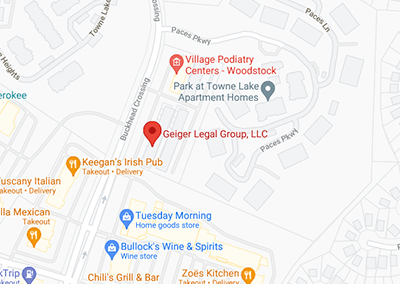Why Do Truck Accidents Happen?
One of the primary causes of truck accidents is the sheer size of semi-trucks, especially when pulling a trailer. A truck pulling an empty trailer weighs about 30,000 pounds, while a truck with a full trailer may weigh up to 80,000 pounds. The heavier a vehicle is, the harder it is to handle and the longer it will take to slow down.
Some of the other common causes of truck accidents in Georgia include the following:
- Impaired driving — Drinking alcohol or using drugs before driving will affect a driver’s abilities in several ways. Impaired drivers may have a harder time reacting to other motorists on the road. They are also more likely to take unsafe risks and even fall asleep behind the wheel.
- Driver fatigue — Truck drivers often have strict delivery deadlines they need to meet. This encourages them to keep driving even when they should stop to rest. Tired drivers experience slower reaction times and impaired judgment.
- Distracted driving — A truck driver who’s talking on the phone, texting, snacking, using a navigation device, adjusting the music, or daydreaming could easily miss a potential hazard in their path. They also risk not seeing slowing cars or hazards in time to slow down or stop safely.
- Unsecured cargo — Semi-trucks are more prone to rollover accidents than other vehicles. A truck’s cargo could shift as the truck is moving if it isn’t properly secured, throwing off the vehicle’s balance. This can make the truck more difficult to control and may even cause a rollover accident as the truck is turning.
- Mechanical defects — All the mechanical parts of a truck must be working properly to minimize the chances of an accident. If there’s a defect with a truck’s brakes, steering, transmission, engine, tires, or other critical components, a driver could suddenly lose control and cause a crash.
- Maintenance problems — Because of the wear and tear they go through on the road, regulators require trucks to follow strict maintenance schedules. If this routine maintenance isn’t done correctly, there’s an increased risk of a sudden mechanical failure when the truck is on the road.
- Negligent driving — Truck drivers who break traffic rules put themselves and others in extreme danger. Speeding, tailgating, not yielding the right-of-way, making unsafe turns and lane changes, cutting other drivers off, and not checking their blind spots are all actions truck drivers can take that may lead to an accident.
- Bad business practices by trucking companies — Trucking companies are supposed to monitor their drivers for bad behavior and hire safe, fully qualified drivers. If a trucking company allows an unsafe or unqualified driver behind the wheel, they put both the truck driver and other motorists around them in danger.
- Poor weather and road conditions — Trucks are difficult to handle in the best weather and road conditions. So it’s no wonder that bad weather or poor conditions frequently cause truck accidents. Rain, snow, or ice on the roads can cause drivers to lose control of their vehicles, along with poorly maintained roads with potholes and debris.
FMCSA Trucking Regulations
Truck drivers and trucking companies must follow certain state and federal laws. The main national agency that oversees the trucking industry is Federal Motor Carrier Safety Administration (FMCSA). Some of the most important regulations truck drivers and trucking companies must abide by are the hours of service.
Hours of service regulations set how long truck drivers can work without taking a required break:
- Drivers can work a shift for up to 14 straight hours if they’ve been off duty for ten or more consecutive hours. This 14-hour work window begins as soon as the driver starts a work-related task, not when they start driving.
- Once the 14-hour window begins, a truck driver can only drive for up to 11 hours during that period.
- Truckers must take a break for at least 30 minutes if it’s been eight or more hours since they last took a 30 minute or longer break.
- A truck driver can only work for up to 60 or 70 hours in a given seven or eight-day week, depending on the particulars of their schedule.
Impaired driving rules set the legal limit for truck drivers and how drug tests are handled:
- While the legal limit for most drivers is a blood-alcohol concentration (BAC) level of 0.08 percent, the legal limit for truck drivers is 0.04 percent.
- Drivers caught with a BAC of 0.04 percent or higher can lose their commercial driver’s license. They may face other criminal penalties as well.
Types of Trucking Accidents Our Dalton Attorneys Can Help You With
No matter how your semi-truck accident occurred, the effects can be devastating. Some of the types of truck accident cases we handle at our personal injury law firm in Dalton, GA include the following:

Common Injuries Suffered in Semi-Truck Accidents
Truck accident victims can suffer from severe injuries, even in what may seem like minor accidents.
Some of the most common truck accident injuries include the following:
Compensation Available in Georgia Truck Accident Claims
If you can demonstrate that a truck driver or another party was negligent and it caused your injuries, you may be able to recover semi-truck accident compensation for the following:
- Medical bills
- Lost wages
- Lower earning potential due to disability
- Pain and suffering
- Emotional distress
- Damaged personal property
Talk to a knowledgeable Dalton truck accident attorney today about what compensation you could receive by filing a personal injury lawsuit.
Talk to an Experienced Dalton Truck Accident Attorney
The Dalton truck accident attorneys at the Geiger Legal Group, LLC have the experience and resources necessary to help you get justice if you’ve been injured. We’re ready to stand up for you if negligence on the part of a truck driver, trucking company, or another entity caused you harm. Contact our office today to discuss your case during a free consultation.

















